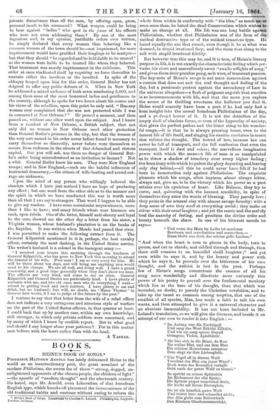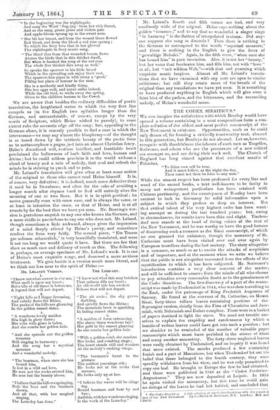BOOKS.
HEINE'S BOOK OF SONGS.•
PROFESSOR KerriEy ARNOLD has lately delineated Heine to the world as an insurrectionary poet, the great assailant of the modern Philistines, the sworn foe of those " strong, dogged, un- enlightened opponents of the chosen people, the children of light" —the apostle of "modern thought" and the nineteenth century. He hated, says Mr. Arnold, even Liberalism of that humdrum English type, which knocks off piecemeal the inconveniences of the old traditional habits and customs without caring to reform the Heine's Book of SO1197. Translated by Charles G. Leland. Philadelphia, Leypoldt, London, 'Minim whole from within in conformity with " the idea," as much as, or even more than, he bated the dead Conservatism which wishes to make no change at all. His life was one long battle against Philistinism, whether that Philistinism was of the form of the unideal destructive type or of the unideal tenacious type. He hated equally the axe that struck, even though it be at what was doomed, in stupid irrational fury, and the roots that clung to the soil with stupid irrational fidelity.
But however true this may be, and it is true, of Heine's literary purpose in life, it is not exactly the characteristic feeling which per- vades his short and marvelously sweet "swallo wflights of song," and gives them their peculiar pang, as it were, of transient passion. The key-note of Heine's songs is not mere insurrection against a custom that does not suit the real thought and feeling of the day, but a passionate protest against the ascendancy of Law in the universe altogether—a flash of poignant anguish that emotion is so incommensurate with life, and that the more you explore the secret of its thrilling sweetness the hollower you find it. Heine would scarcely have been a poet if he had only had a keen insight into the unreal humdrum Philistinism of the day, and a profound horror of it. It is not the detection of the empty shell of obsolete forms, or even of the hypocrisy of society, that gives the perfect pathos and the bitter sting to his wonder- ful songs,—it is that he is always pressing home, even to the inmost life of life itself, and singing his vanitas vanitatunz in music that refutes the thought. The hatred of law, because law can never be full of transport, and the full confession that even the transport itself is dust and ashes; the marvellous imaginative power with which the meanest life of man is so manipulated as to throw a shadow of treachery over every higher feeling ; the keen irony with which be paints the glory departing and leaving only clay behind,—all this he could never have felt if he had been in insurrection only against Philistinism. The exquisite pleasure which his songs, often impious, almost always bitter, always sad, give us, is in the victory which his power as a poet attains over his cynicism of heart. Like Balaam, they try to curse, and, quivering with the keenest sensibility, in spite of themselves they utter the words of blessing. They parody love ; they paint-in the sensual clay with almost savage ferocity; with a deep sense of awe they scoff at everything awful ; they make us shiver with their cruel laughter ; and yet the music and the melody heal the anarchy of feeling, and proclaim the divine order and beauty beneath the chaos. In one of his bitterest moods Ile says-
" Und wenn das Herz im Leibe ist zerrissen Zerrissen nnd zerschnitten and zerstochen,— Dann bleibt uns dock das schone gelle Lachen."
"And when the heart is torn to pieces in the body, torn to pieces, and cut to shreds, and riddled through and through, then there still remains to us, beautiful shrill laughter ;" and yet even while he says it, and by the beauty and power with which he says it, he prevails over the bitterness of his own thought, and the satirist is lost in the poet. Perhaps few of Heine's songs concentrate the essence of all his song more wonderfully and illustrate more curiously this power of his poetry to prevail over the fundamental mockery which lies at the base of his thought, than that which was intended, no doubt, to parody the Christian revelation, and to take up the taunt so common among sceptics, that one of the smallest of all species, Man, has made a faith to suit his own wants, and then attempted to give it a universal character and an absolute immutability. It has not been included in Mr. Leland's translation, so we will give the German, and beside it an attempt of our own to render it into English : -
" Im Anfang wur die Nachtigall Und sang das Wort Ziikiiht Zilkiiht, Und wie sie sang spross iiberall Grungras, Violen, Apfelbliith'.
" Sie bias sich in die Brust, da floss Ihr rothes Blut, and ans dem Blut Ein schtiner Rosenbaum entepross Dem singt sie ibre Liebesglnth.
" Una Vogel all in diesem Wald Versohnt das Blut ass jener Wand' ; Doch wenn das Rosenlied verhallt Geht each der game Wald zn Grund."
So spricht zu seinen Spatzelein Inv Eichennest der alto Spatz; Die Spatzin piepet manchmal drein, Sic hockt anf ihrem Ehronplatz.
Sie ist ein hauslich gates Weib Und briitet bray and schmollet nicht; Der Alto giebt zum Zeitvertreib Den Kindern GlaHbeasnaterricht. In the beginning was the nightingale, And sang the Word Jug-jug' from her rich throat, And as she sang, green grass and violets pale And apple-bloom sprang up to the sweet note.
" She bit her breast, and from the wound there flowed Red blood, and from the blood a red rose sprang ; To which the fiery love that in her glowed The nightingale in fiery music sang.
"The blood that from that wounded bosom flows Atones the birds that in this thicket dwell, But when is hushed the song of the red rose The whole live thicket dies away as well."
So speaks the sparrow to his little brood Which in the spreading oak enjoy their rest, The sparrow-hen pipes in with many a ' good,' Filling her place of honour in the nest.
She is a motherly and kindly thing, Sits her eggs well, and never sulks indeed, While the old bird, to while away the spring, Gives to the children lessons in the Creed.
We are aware that besides the ordinary difficulties of poetic translation, the lengthened metre to which the very first line compels us (in the English two syllables longer than the German, and untranslatable, of course, except by the very words of Scripture, which Heine wished to parody), to some extent rubs the sarcastic edge off the song ; but, appealing to the German alone, it is scarcely possible to find a case in which the irreverence—we may say almost the blasphemy—of the thought is so toned down by the intrinsic beauty of the poetic form as to metamorphose a pagan jest into an almost Christian fancy. Heine's disordered will, restless intellect, and insatiable heart proclaimed the hollowness of both faith and love, human and divine ; but he could seldom proclaim it to the world without a cloud of beauty and a rain of melody, that cool and refresh the minds be is striving to parch and to pain.
Mr. Leland's translation will give often at least some notion of the original to those who cannot read Heine himself. It is, of course, very defective ; it is, indeed, much more defective than it need be in literalness, and often for the sake of avoiding a longer search after rhymes hard to find will entirely alter the meaning of one or two lines. But it is in spirit poetical ; its metre generally runs with some ease, and is always the same, or at least in intention the same, as that of Heine, and is at all events by fur the best that we have yet seen. Mr. Bowring's ver- sion is gratuitous anguish to any one who knows the German, and a mere riddle in poetic fame to any one who does not. Mr. Leland, though sometimes a little awkward, always gives the impression of a mind deeply stirred by Heine's poetry, and sometimes renders the form very fairly. The second piece, " Ein Traum gar seltsam schauerlicb," is very beautifully translated, and were it not too long we would quote it here. But there are few that show as much care and delicacy of touch as this. The following is, perhaps, an average specimen of Mr. Leland's work. It is one of Heine's most exquisite songs, and deserved a more anxious treatment. We give beside it a version much more literal, and we think not less near to the spirit of Heine :—
Ma. Limasn's ArEasion. THE LORE-tEr.
I.
"I know not what sorrow is o'er me, What spell is upon my heart ; But a tale of old times is before me, A legend that will not depart.
"Night falls as I linger dreaming, And calmly flows the Rhine, The peaks of the hills are gleaming In the golden sunset shine.
"A wondrous lovely maiden Sits high in glory there ; Her robe with gems is laden, And she combs her golden hair.
"And she spreads out the golden treasure Still singing in harmony ; And the song has a mystical measure And a wonderful melody.
"The boatman, when once she has bound him, Is lost in a wild sad love, He sees not the rocks around him, He sees but the beauty above.
s.
"I believe that the billows springing, Both- the boat and the boatman drown, And all that, with her magical sinLgior n g, The e-ley has done." I.
"I know not what this may betoken That sadness fills my heart ; An old-world tale has awoken Echoes tlutt will not depart.
2.
"The air cools ; the sky grows darkling, And quietly flows the Rhine ; The mountain brow is sparkling In fading sunset shine.
a.
"A maiden of form entrancing Sits above there wondrous fair! Her gold in the sunset glancing As she combs her golden hair.
4.
"With a golden comb she sunders Her locks, and combing sings ; The heart stands still and wonders At the melody's rushing wings.
" The boatman's heart iu the pinnace The saddest yearnings stir ; He looks not at the rocks that menace, He looks only up at her.
"I believe the waves will be cling- ing Round boatman and boat by and bye ; And this, with her wondrous singing, Is the work of the Lore-ley." Mr. Leland's fourth and fifth verses are bad, and very needlessly wide of the original. Heine says nothing about the golden "treasure ;" and to say that so wonderful a singer sings " in harmony " is the flattest of interpolated truisms. Did any- one suppose she sang in discords ? Then there is nothing in the German to correspond to the words "mystical measure," and there is nothing in the English to give the force of " gewaltige Melodei." Again, in the fifth verse, " when once she has bound him" is pure invention. Also, it is not her " beauty," but her voice that fascinates him, and fills him, not with "love " at all, but " mit wildein Weh,"—with that sad yearning which exquisite music inspires. Almost all Mr. Leland's transla- tions that we have examined with any care are open to similar criticisms ; but still they retain more of the breath of the original than any translations we have yet seen. It is something to have produced anything in English which will give even a faint hint of the pathos, and the bitterness, and the reconciling melody, of Heine's wonderful muse.































 Previous page
Previous page